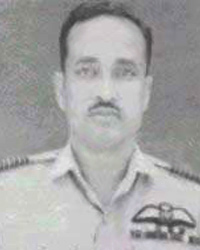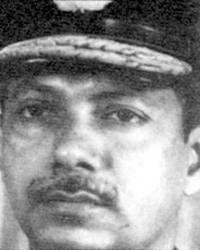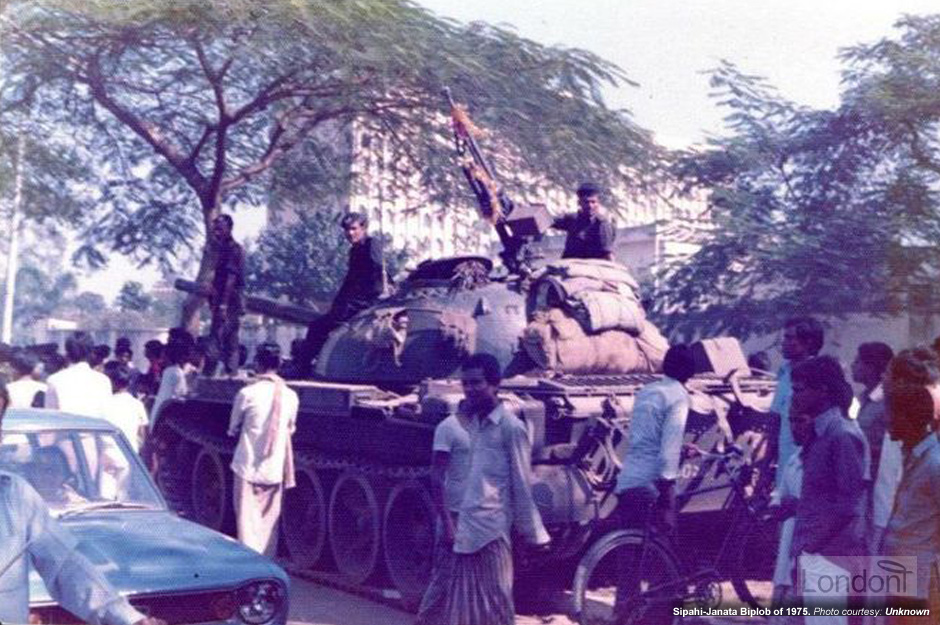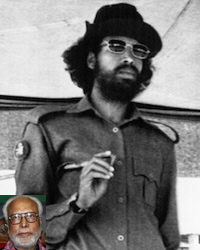
Sheikh Mujib's killers return for another mutiny
In March-April 1976 the regrouping and replacement of troops was carried out in a major decision directed at avoiding concentration of potentially dissident elements of the army. The regiments of Dhaka Brigade were divided into several groups and sent out to different regional cantonments, and the 9th Division was given responsibility for maintaining security in the capital city.
General Zia faced particular difficulty in sending the Bengal Lancers' tank regiment from Dhaka to Bogra, a city in western Bangladesh. But he finally succeeded after the then Air Force Chief and fellow Deputy Chief Martial Law Administrator, Air Vice-Marshall M. G. Tawab, threatened air action against the tank regiment.
Air Vice Marshall M. G. Tawab, Chief of Air Force, addresses large Jamaat-e-Islami gathering
In March 1976 - on the fifth anniversary of Bangladesh's independence - Vice Marshall Tawab, a practising Muslim, attended and addressed a big religious gathering organised by Jamaat-e-Islami in Dhaka at which slogans were raised to revert Bangladesh into an Islamic state (as opposed to a secular one demanded by the leftists). It is alleged that Vice Marshall Tawab had suggested to navy chief Rear Admiral M. H. Khan that Bangladesh should indeed be declared an Islamic Republic, to which the navy chief agreed. Four months earlier, both men had excitedly placed the badges of a Major General's rank on Khaled Musharraf, who had just house-arrested Ziaur Rahman and replaced him as Chief of Army Staff.
For his Islamic stance, Vice Marshall M. G. Tawab was labelled as 'pro-Pakistani' by his critics.
 M. G. Tawab ()
M. G. Tawab ()
Several points may be made about that gathering. Using the pretext of waz mahfil - a meeting of religious preaching - this gathering brought Islamist activities into the political arena. This was the first large-scale gathering of the Islamists since independence. While all political activities were banned under military regulations, Islamists were given carte blanche, and they made use of it to the fullest. The close liaison between the regime and the Islamists was made public as a deliberate message to the nation at large.
Ali Riaz, author of "God Willing: The Politics of Islamism in Bangladesh" (2004)
The secular Joi Bangla slogan was, within moments of the coup d’ etat, replaced by the Pakistan-style zindabad. Three months later, the slogans raised by Bangladesh army soldiers minutes into the murder of Khaled Musharraf and his fellow officers were eerily symbolic of a further regression in national history. Naraye Takbir and Allah-o-Akbar were sounded, signifying the collapse of Bengali nationalism in the country. A couple of months later, the newly installed air chief, M.G. Tawab, addressed a seerat conference in Dhaka, making it clear which way the country was headed under its first military dictator Ziaur Rahman.
Syed Badrul Ahsan, Journalist
Bogra Mutiny led by Syed Farook Rahman
The presence of Vice Marshall Tawab at the Jamaat-e-Islami rally was also significant for another reason. It is alleged that in the following month, in a surprise move, Vice-Marshall Tawab brought back four of the "Killer Majors" from Libya and tried to trigger off another coup to dislodge General Zia and take power with the help of a discontented and organised faction of the army.
On 30 April 1976 a group of army officers belonging to the tank regiment rebelled in Bogra, ironically the hometown of Ziaur Rahman. The rebellion was led by Colonel Syed Farook Rahman, who only eight months earlier had orchestrated the killing of Sheikh Mujibur Rahman and his family, followed by that of the four Mujibnagar leaders. Farook and the other 'killer majors' were subsequently barred from re-entering Bangladesh, however, in mid-April 1976 some of these officers returned to the country secretly, evidently helped by members of the Zia regime.
Colonel Farook managed to reach his loyalists and begin the assault. The conspirators called for the creation of an Islamic state and demanded a share of political power.
The attempt, in hindsight, can be described as an abortive bid by the Islamists to take power.
The government threatened to annihilate the entire unit if it did not surrender. Farook was coaxed by his parents and sister to give in on condition that he could go into exile and never be tried. The regime lived up to its end of the bargain. General Zia forced Vice-Marshall Tawab to resign as Chief of Air Force, replacing him with Air Vice Marshall M. Khademul Bashar, and removed him from all posts occupied by him. Vice Marshall Tawab was exiled from the country to Europe whilst the "Majors" were sent back to Libya again. General Zia then disbanded the Bengal Lancers' tank regiment, the power base of the "Majors", and placed nearly half of its 500 members on charges.
Farook was later given diplomatic position by the Zia regime. He returned to the country in 1986 and formed a right-wing political party named the Freedom Party. He was elected to Parliament in an election boycotted by the major political parties in 1986 and conducted under another military ruler, General Ershad.
 Syed Farook (or Faruque) Rahman ()
Syed Farook (or Faruque) Rahman ()  M. Khademul Bashar ()
M. Khademul Bashar ()

Government vs leftist parties
Post 1975, most political groups in Bangladesh, as well as the vast majority of the people, supported the government. The main opposition came from leftist parties which were determined to overthrow the government. Amongst these were the Jatio Samajtantric Dal (JSD, or Jashod for short - Socialist Nationalist Party) and its affiliates, a minority section of the former BAKSAL known as the 'Mujibites' (followers of Sheikh Mujib), and two factions of the Sarbohara Party (The Communist Party), one led by Kamal Haider and the other by Lieutenant Ziauddin.
 Kamal Haider ()
Kamal Haider ()
Violent approach by groups
Following Colonel Taher's arrest the JSD charged the Zia-led government of betraying the cause of the "Sepoy Biplob" (Revolution). They believed a military junta would never transfer political power voluntarily and could only be overthrown through a peoples' united movement. General Zia, however, tried to negotiate with the JSD leaders for a political settlement. M. A. Awwal, one of the JSD leaders, claimed that he tried to arrange meetings between the military government and the JSD leaders. But the underground leaders of the JSD remained adamant.
Following Lenin's dictum that there cannot be a communist revolution in a country unless half of the country's army is converted into communists first, JSD leaders continued their clandestine attempts to proselytize within the ranks of the Army.
Talukder Maniruzzaman, author of "Bangladesh in 1976: Struggle for Survival as an Independent State" (1976)
The Mujibites accused the government of usurping power from the legally constituted government of Sheikh Mujib, and sought to overthrow it with the help of Kader Siddiqui's group in India. They began to spread disaffection among the tribal people in the district of Mymensingh in order to foment a rebellion. Lieutenant Colonel Ziauddin of the Sarbohara Party joined Manabendra Narayan Larma, a former Member of Parliament of Bangladesh, in an armed movement to secure "autonomy" for the Chittagong Hill Tracts, whilst Kamal Haider's group were indulging in sporadic bomb blasts in urban areas to rock the government.
 M. A. Awwal ()
M. A. Awwal ()  Kader Siddiqui ()
Kader Siddiqui ()  Manabendra Narayan Larma ()
Manabendra Narayan Larma ()
There were also reports of sporadic violence in the countryside with the Mujibites and the JSD establishing a working alliance to eliminate their political foes in the villages. According to Bangladesh press reports, from January to November 1976, these "miscreants" killed about 409 people, mostly in the rural areas. The victims were mainly Union Council Chairmen and members, and wealthy peasants. Following a crackdown, the law enforcing authorities arrested over 1,000 "miscreants" and the Summary Martial Law Courts convicted around 600 people for "keeping illegal arms, distributing prejudicial literature and sabotage activities". The JSD-sponsored leaflets, however, alleged that the government arrested more than 10,000 political workers and the army liquidated some of them without any trial.
In face of these challenges, the military government first concentrated on strengthening internal security and the armed forces.
Following the political trial and the first political execution in Bengal since that of Khudiram - a Bengali nationalist who was hanged by the British at the turn of the century (1908) for anti-British terrorism - knowledgeable quarters within Bangladesh felt that the disastrous results of Taher's attempted coup, which had pitted soldiers against officers, and its ultimate failure would discourage similar adventurism within the country's defence forces. This was not to be.
Zillur R. Khan, author of "Politicization of the Bangladesh Military: A Response to Perceive Shortcomings of Civilian Government" (1981)
